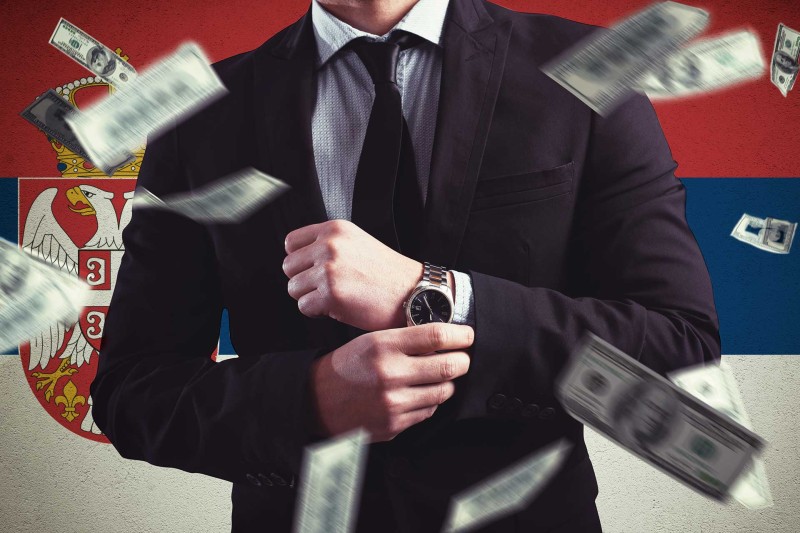Miroslav Mišković stood before a group of small investors Aug. 19, 2005, and told them he needed their help. He wanted to buy their shares of C Market, a Serbian grocery chain, but businessman Milan Beko was pressuring the government to block him. Go out and protest, hold public rallies and don't let the government block this sale, Mišković told the shareholders, mostly store employees.
Mišković didn't mention that the government and Beko were all that stood between him and a monopoly over Serbia's grocery business that would allow him to decide what people would pay for food. His Delta chain of Maxi stores already had the largest profits of any grocery in Belgrade.
A few hours later Mišković attended a meeting in Belgrade with Beko that was called by former Prime Minister Vojislav Koštunica and cut a deal for control of the company. A memorandum of that meeting – drawn up by Mišković, Beko and the director of C Market, Slobodan Radulović – outlines the decisions that gave Beko majority control, on condition that he sell all of his shares to Mišković within two years.
“I was at the shareholders meeting, and Mišković told us that Beko plays so dirty, he couldn't deal with him,“ shareholder Nada Cerić said in a recent interview. “Shareholders had about 75 percent of C Market, but they were the ones negotiating. They were negotiating about something which was not theirs. Nobody asked us.”
Details of this meeting were not made public until years later.
This memorandum is among hundreds of pages of documents obtained by the Organized Crime and Corruption Reporting Project (OCCRP) that show how C Market became part of the Delta empire. The documents, including state anti-corruption council records, witness testimony from criminal and civil trials, lawyer memos and shareholder records, show in detail the political influence behind the scene, and the easy access to cash and bank loans that Mišković and Beko enjoyed.
The records, some already reported on, others never before revealed, provide an inside glimpse at how business was done at the highest levels of Serbian government. And they show how how smart, powerful businessmen such as Mišković and Beko used offshore companies. Beko later testified that he routinely set up “shell companies” in his deals – including winning control of C Market.
The takeover of C Market still resonates throughout Serbia, in large part because two businessman and a top political leader made a closed-door decision that would affect how people shopped for groceries for years to come.
In the past three months, a group of former C Market employees has started a new round of protests and picketing, claiming Mišković cheated them in the final sales agreement and paid too little for their shares. Dozens of employees fired by Radulović are also protesting to be rehired at C Market.
And the sale is still being scrutinized by anti-monopoly investigators and the state anti-corruption council. Verica Barać, president of the anti-corruption council, said her investigators are preparing a final report that will be turned over to prosecutors.
Mišković, in turn, filed a series of charges protesting the state anti-monopoly commission's decision that his takeover created an illegal monopoly. The case is now pending at Administrative Court.
Privatizing a grocery store
Serbia in 2001 passed a law on privatizing companies, formalizing procedures from 1997 that gave directors of state-run companies management positions and ownership stakes when they went public. The law ensured that people loyal to the government – they gained their positions in the first place because of government appointments – were rewarded.
In 2002, the state began its final stage of privatizing C Market, which at the time had about 28 percent of the market and was Delta's biggest rival. Employees demanded a prospectus, as was customary. Radulović, the director, ignored their requests, according to records of the state anti-corruption council. He also told the employees he would hold their shares of the company and act in their interest for the next five years. About 135 employees – five percent of the workforce --who rejected his offer were fired over time.
Radulović also promised shares of the compny to the Youth Workers Union, a group of employees who weren’t with C Market during its intial stage of privatization in 1991 and didn’t have shares. The move was part of an apparent effort to win their backing during the fight for control.
The controversy and infighting created havoc at the company and opened the way for potential buyers, court records show. One of them was Mercator, a Slovenian company, which made a bid to take over company in 2004.
Radulović and his board of directors urged employees to reject what it called a “hostile bid.“ Board members said a Mercator takeover would mean “the end of independent development of Serbian trade,“ according to records from the anti-corruption council.
The Youth Union Workers also backed Radulović with pickets and protest marches filled with slogans such as “We don't want to learn Slovenian.“
That's when Mišković and his Delta M stepped in, Serbian stock registry records show. Other companies, including a London firm, also showed interest.
Mišković, eager to win, began increasing pressure on politicians and lobbying the workers, according to shareholder affidavits and testimony filed with the anti-corrupton council.
Behind the scenes, in the summer of 2005, a deal was in the works to settle the matter and give control to Beko, and eventually to Delta, according to testimony and records introduced at the hearings for the bankruptcy fraud case, in which 35 people were arrested. Just weeks before a deal was finalized, Beko set up Novafan S.A. in Luxembourg as a shell that would take possession of C Market, Beko testified at the hearings.
Mišković continued to publicly rail against Beko, according to shareholder records, even on the day he, Beko, and Radulović met. Under terms of the agreement, Radulović’s company Primer C would buy worker’s shares and then transfer 60 percent of the company to Beko, and 40 percent to Mišković.
The final price, of about €300 per share, was less than what C Market could have gotten in a fair auction, lawyers for the shareholders said.
The deal, which was not made public, called for Beko to sell his stake to Mišković and Delta within two years. Luxembourg business registry records show that in 2008 Beko sold his shares of Novafan to of Luxembourg to Hemslade Trading of Cyprus. Hemslade is owned by Mišković and is the parent of his sprawling Delta empire.
To the outside world, it appeared that Mišković had not won control. But many reformers inside and outside the government complained that the process was not open and demanded investigations.
Details of the C Market sale began emerging in 2007 during testimony and trials involving the bankruptcy mafia investigation.
Radulović was indicted as being a leader of the bankruptcy scam, and fled to Spain. But in abstentia in 2007 he sent a letter to the state Anti-corruption Council accusing Mišković, Koštunica and Beko of pressuring him to give up control of C Market at the expense of shareholders. A prosecutor who helped Radulović break off the shareholder's assembly at C Market was also charged in the bankrupty case.
In his letter Radulović revealed the secret memorandum and accused Mišković, Beko and Koštunica of conspiring against him.
The memorandum signed at the meeting said the deal was being made, "in the interest of national economic development and efficient operation of the wholly national market." Subsequent testimony and statements revealed that members of the government wanted to keep foreign companies out of the market and backed Mišković's bid to keep it in Serbian hands.
The memo never mentioned that Mišković's entire operation is based in Cyprus, or that Beko had set up shell companies in Luxembourg to serve as owners of his share.
”People talked about patriotism and not letting foreign companies in our market. But Delta is a foreign company owned in Cyprus, and (Beko's firm) is a foreign company," said Verica Barać, president of the anti-corruption council. "You have offshore companies as owners now.”
In 2006, the state Protection of Competition Commission was formed and immediately began probing whether the sale created a monopoly. So did the anti-corruption council, which did not have arrest or prosecution powers. The council is prepraring a report that it will submit to state investigators and prosecutors.
The competition investigators found that Mišković, in fact, owned Delta Maxi stores, C Market and Pekabeta, another chain, giving him more than 60 percent of the total retail market.
"The takeover of C Market was illegal and Delta clearly gained a dominant position in the market," said a Dijana Marković–Bajalović, who was then president of the Competition Commission. "The government knew that."


